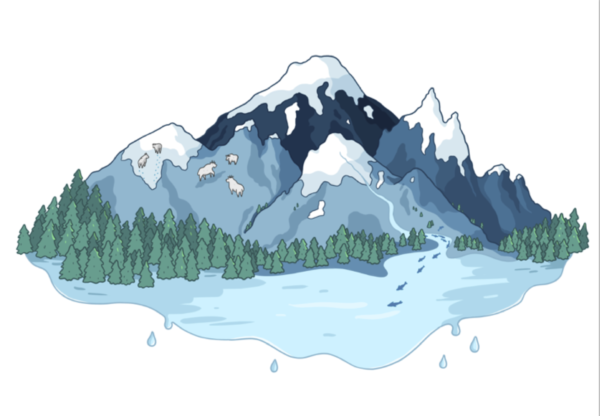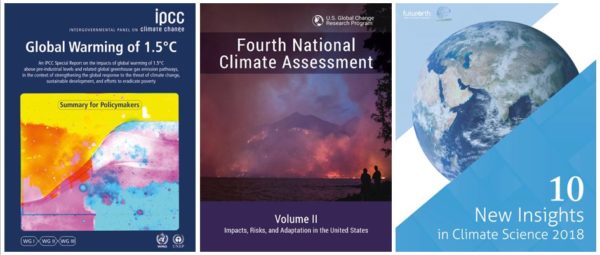This month’s open thread on climate science issues. Remember that discussions about climate solutions go here.
Archives for 2019
Alpine glaciers: Another decade of loss
Guest Commentary by Mauri Pelto (Nichols College)
Preliminary data reported from the reference glaciers of the World Glacier Monitoring Service (WGMS) in 2018 from Argentina, Austria, China, France, Italy, Kazakhstan, Kyrgyzstan, Nepal, Norway, Russia, Sweden, Switzerland and United States indicate that 2018 will be the 30th consecutive year of significant negative annual balance (> -200mm); with a mean balance of -1247 mm for the 25 reporting reference glaciers, with only one glacier reporting a positive mass balance (WGMS, 2018).

References
The Crank Shaft
Unforced variations: Mar 2019
The best case for worst case scenarios
The “end of the world” or “good for you” are the two least likely among the spectrum of potential outcomes.
Stephen Schneider
Scientists have been looking at best, middling and worst case scenarios for anthropogenic climate change for decades. For instance, Stephen Schneider himself took a turn back in 2009. And others have postulated both far more rosy and far more catastrophic possibilities as well (with somewhat variable evidentiary bases).
[Read more…] about The best case for worst case scenariosReferences
- S. Schneider, "The worst-case scenario", Nature, vol. 458, pp. 1104-1105, 2009. http://dx.doi.org/10.1038/4581104a
Update day
So Wednesday was temperature series update day. The HadCRUT4, NOAA NCEI and GISTEMP time-series were all updated through to the end of 2018 (slightly delayed by the federal government shutdown). Berkeley Earth and the MSU satellite datasets were updated a couple of weeks ago. And that means that everyone gets to add a single additional annual data point to their model-observation comparison plots!
Forced Responses: Feb 2019
A bimonthly thread on societal responses to climate change. Note that there is another open thread for climate science topics. Please stick to specifics as opposed to arguments about ethics, politics or morality in general.
Unforced variations: Feb 2019
What the 2018 climate assessments say about the Gulf Stream System slowdown
Last year, twenty thousand peer reviewed studies on ‘climate change’ were published. No single person can keep track of all those – you’d have to read 55 papers every single day. (And, by the way, that huge mass of publications is why climate deniers will always find something to cherry-pick that suits their agenda.) That is why climate assessments are so important, where a lot of scientists pool their expertise and discuss and assess and summarize the state of the art.
So let us have a quick look what last year’s climate assessments say about the much-discussed topic of whether the Atlantic Meridional Overturning Circulation (AMOC, a.k.a. Gulf Stream System) has already slowed down, as predicted by climate models in response to global warming.

New Ocean Heat Content Histories
Guest commentary from Laure Zanna (U. Oxford) and G. Jake Gebbie (WHOI)
Two recent papers, Zanna et al. (2019) (hereafter ZKGIH19) and Gebbie & Huybers (2019) (hereafter GH19), independently reconstructed ocean heat content (OHC) changes prior to the instrumentally-based records (which start ~1950). The goals (and methodologies) of the two papers were quite different – ZKGIH19 investigated regional patterns of ocean warming and thermal sea level rise, while GH19 analyzed the long-term memory of the deep ocean – but they both touch on the same key questions of climate forcing and response.
[Read more…] about New Ocean Heat Content HistoriesReferences
- L. Zanna, S. Khatiwala, J.M. Gregory, J. Ison, and P. Heimbach, "Global reconstruction of historical ocean heat storage and transport", Proceedings of the National Academy of Sciences, vol. 116, pp. 1126-1131, 2019. http://dx.doi.org/10.1073/pnas.1808838115
- G. Gebbie, and P. Huybers, "The Little Ice Age and 20th-century deep Pacific cooling", Science, vol. 363, pp. 70-74, 2019. http://dx.doi.org/10.1126/science.aar8413
